Sunday, 17 February 2019, 9:30-4:30pm
The “buy local” and “slow clothes” movements that center on sustainability, natural, small batch or organic production, in tandem with responses to climate change are bringing renewed vitality to island fleece production. Join Vancouver Island Fibreshed and the Mid Island Farmers Institute on Sunday, Feb 17th, 2019 from 930 – 4:30 at the Merville Hall, in the Comox Valley, to learn more about sheep, alpaca and llama fleece.
Learn how to improve fleece quality, value fleece, get more value for your fleece and select fleece for projects and products. Learn where to find local fleece, where to process it, how to price it and sell it. Find out more about emerging markets for locally produced fleece, yarn and fibre products. This event is designed to encourage networking between farmers and end users as well as to support local fleece production, island farming and an island fibre economy.
The morning will open with a Conversation about basic nutrition for the animal, condition scoring, valuing the entire fleece, shearing site set- up, fleece preparation, wool contamination and more. Morning and afternoon Conversations will be led by presenters: Tracy Brennan of Inca Dinca Do Farm and Fibery; Pieter Demooy of Last Side Shearing; Megan Halstead P. Ag of Halstead Farms; Jeryl Lowe of Black Creek Spinners and Lorea Tomsin of Country Wools/ President of Inter Island Breeder Association.
Lunch is provided with two short videos, Climate Beneficial Wool and Resilience both created by the California Fibreshed. After lunch browse the various displays and hands on resource tables, chat with presenters and attend demos. Topics include: Parasite Prevention, Detection and Treatment, Good Fleece/Garbage Fleece, Breeds & Fleece, Skirting, Selecting Fleece for Spinners, Felters & Makers and The first annual Merville Farm, Fleece & Fibre promotion event. Get your fleece and local fibre related products listed on the Vancouver Island Fibreshed’s online Producer Directory & Map.
The afternoon conversation will focus on markets for fleece, emerging markets, and market development. How can island spinners and felters be encouraged to buy local fleece? With a new mill on Vancouver that is now also spinning yarn, come new opportunities. Vancouver apparel brands and designers are looking for local materials. Top quality fleece is in demand.
Hotter, dryer summers mean growers have to find ways to retain moisture in the soil. Wool works wonders for moisture retention. Pelleting substandard wool for a soil amendment or using it as a layer in garden beds, flower planters, hanging baskets or for a green roof base all mean an increase in fleece use and value.
For tickets ($25 for farmers/VIF members and $35 for general admission) and more information see www.vancouverislandfibreshed.ca or contact info@vancouverislandfibreshed.ca

